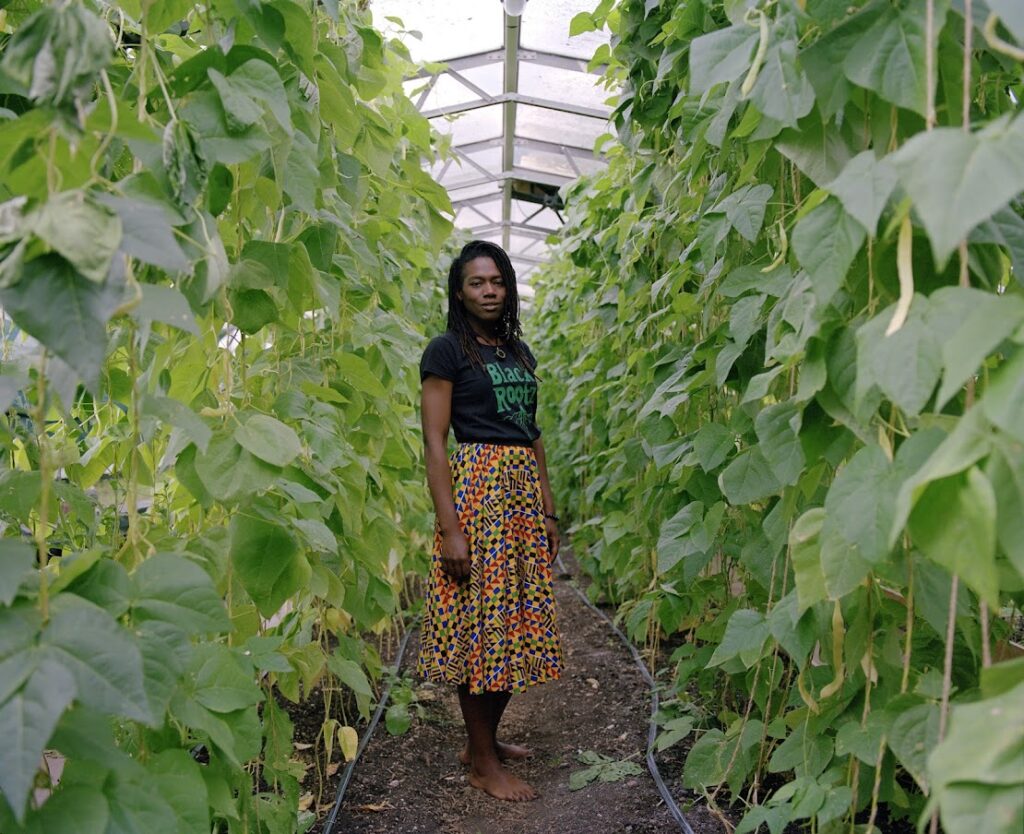“The world doesn’t change one person at a time. It changes as networks of relationships form among people who discover they share a common cause and vision of what’s possible. This is good news for those of us intent on changing the world and creating a positive future. Rather than worry about critical mass, our work is to foster critical connections. We don’t need to convince large numbers of people to change; instead, we need to connect with kindred spirits. Through these relationships, we will develop the new knowledge, practices, courage and commitment that lead to broad-based change.”
The words of Margaret Wheatley and Deborah Frieze, threaded through their Emergence theory of change, have inspired The Gaia Foundation for decades, underpinning our approach as we strive for a radical reimagining of our relationship with each other and the Earth. Emergence can be understood as the way in which systems transform through critical connections, collaboration, and creativity. Relationships converge and interweave to create networks, strengthened with every ‘critical connection’. The more connections found and formed, the greater the resilience. Gaia’s other great lodestar – nature – shares in this same formational force: dynamic, reciprocal relationships are what make life on our living planet possible. Nature teaches us that all elements of successful ecosystems interact, adapt and grow in resilience thanks to their diversity. This fundamental principle of community and ecosystem organising has been key in Gaia’s work, from the African Earth Jurisprudence Collective to the UK & Ireland Seed Sovereignty Programme, and most recently, We Feed The UK.
We Feed The UK is a multi-partner, multi-media storytelling project elevating examples of grassroots change: led by food producers across England, Ireland, Scotland and Wales who are restoring the nature-friendly and society-enriching practices that nurture people and planet. Forming in 2023, our first exhibition opened in Liverpool in 2024 and we have since exhibited ten stories in ten unique locations, each accompanied by events tailored to local landscapes and lives. All ten stories were finally brought together at the Complete Collection of Photography and Poetry exhibition and open house in Bristol during spring 2025, and the We Feed The UK book launched this summer.


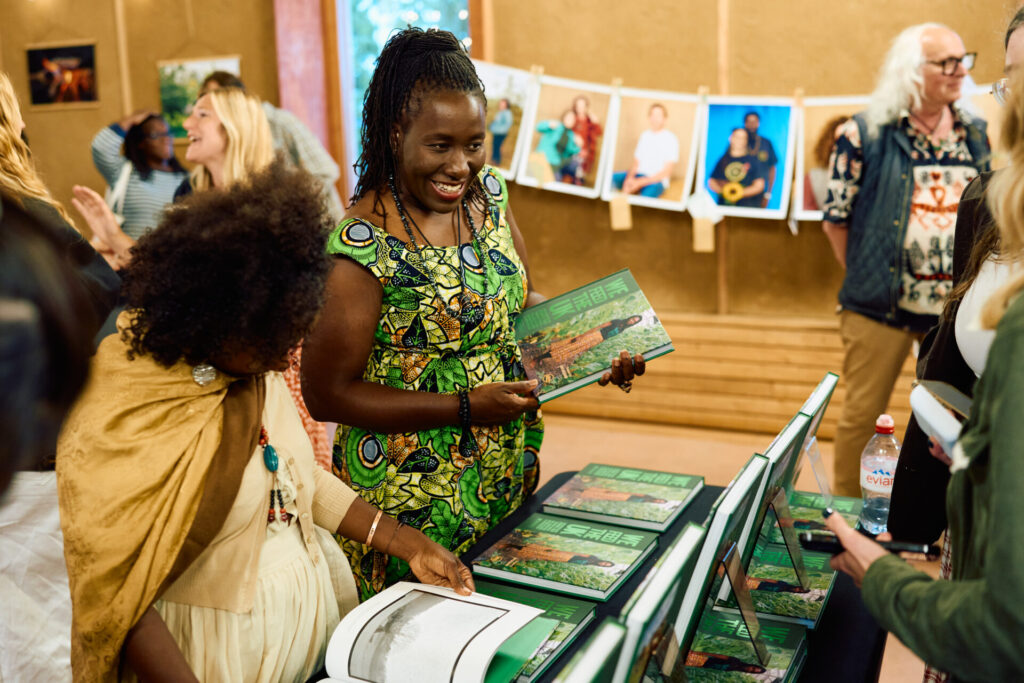
The roots of We Feed The UK were planted almost a decade ago when The Gaia Foundation first embarked on a collaboration across the environment and arts sectors, entitled We Feed The World. The project told fifty stories of small-holder and family farmers and fishers from across six continents through partnerships with a network of world-renowned, globally-spread photographers. The scale of ambition was exceeded only by the impact of the stories we would share. Those of humble protagonists quietly resisting the tide of modern industrial agriculture by establishing seed saving networks, women-led cooperatives, and community food growing initiatives. The stories were a powerful and hopeful counter to the dominant narrative that we need an industrial food system to feed the world.
To amplify this counter-narrative, we positioned these stories of agroecology within the media at a time when there were, simply, none. Working with celebrated photographers – including Rankin, Graciela Iturbide, Sophie Gerrard and Martin Parr – was key to this approach, as picture desks and editors finally took note. Alongside project lead Francesca Price and curator Cheryl Newman, The Gaia Foundation commissioned 47 photographers to capture the lives of farming and fishing communities, culminating in 2018 when over 300 images were exhibited across The Barge House on London’s South Bank, alongside ten days of events celebrating the movement. Guy Singh Watson, farmer and founder of Riverford, said at the time:
“I braced myself for patronising peasant-porn, but my prejudices were quickly allayed by the intimacy and truth of the images. They gave a window into a world in which we all have ancestral roots; one that is fast being replaced by large-scale brutality and destruction. It moved me, as art should, to ask questions of our world, and of Riverford’s part in it.”
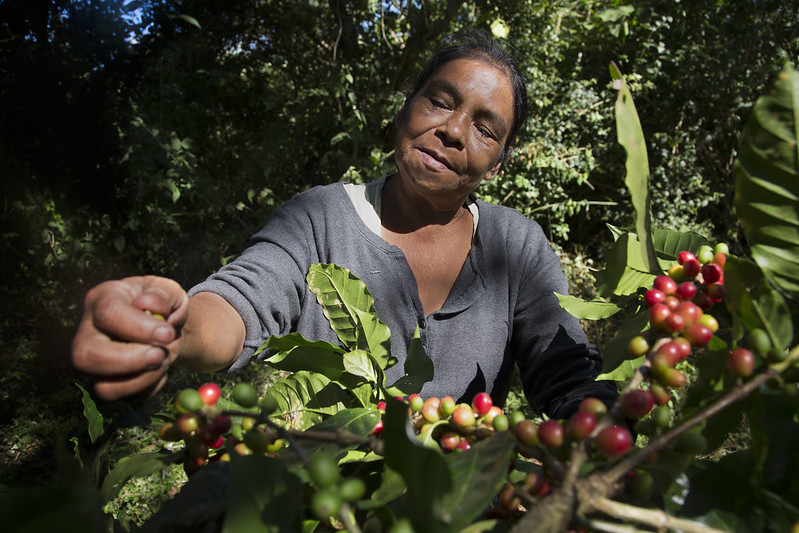
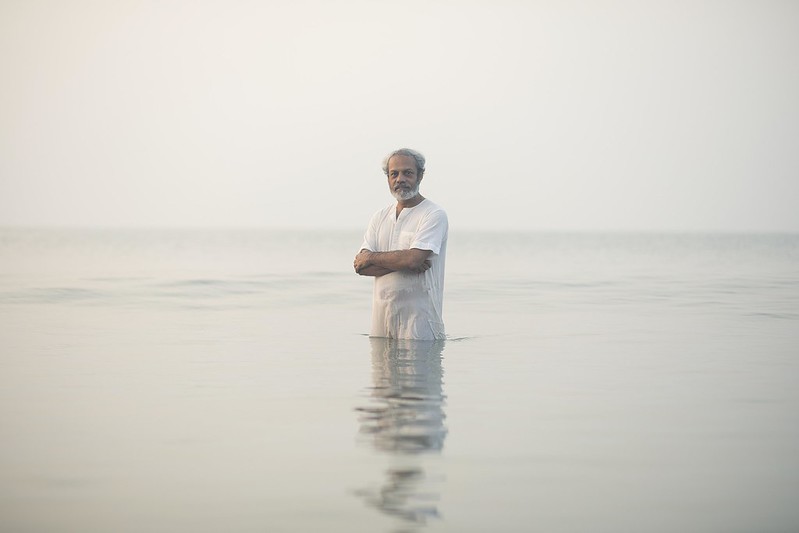
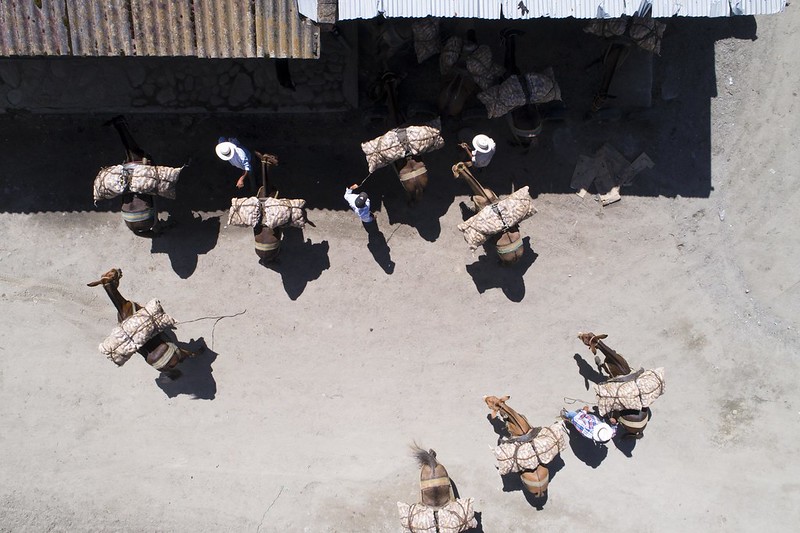
We Feed The World affirmed for us why collaborating with artists and connecting across the silos of sectors is imperative if we are to collectively respond to the urgency of the climate, biodiversity and justice crises. It also became an incredible example of emergence in action. Whilst worlds apart geographically and facing unique challenges in their countries, the fifty stories shared through We Feed The World were united by practices that enhance the potential for future generations of all species to thrive. They “shared a common cause and vision of what’s possible“; by connecting them, we witnessed the protagonists see and celebrate that they were part of a wider movement. Through this, they could find strength and solidarity.
While this global constellation formed, we realised it was critically important to bring things back to the hyperlocal scale so that solidarity could be transformed into a tangible step forward. All those featured in We Feed The World received an exhibition pack of fifty portraits from the full collection, enabling them to celebrate their role in the movement for agroecology, and raise awareness among their own communities. These simple, low-cost and no-frills packs resulted in exhibitions popping up globally, led by the individuals themselves, reinforcing their sense of pride and place within that international network of change-makers.
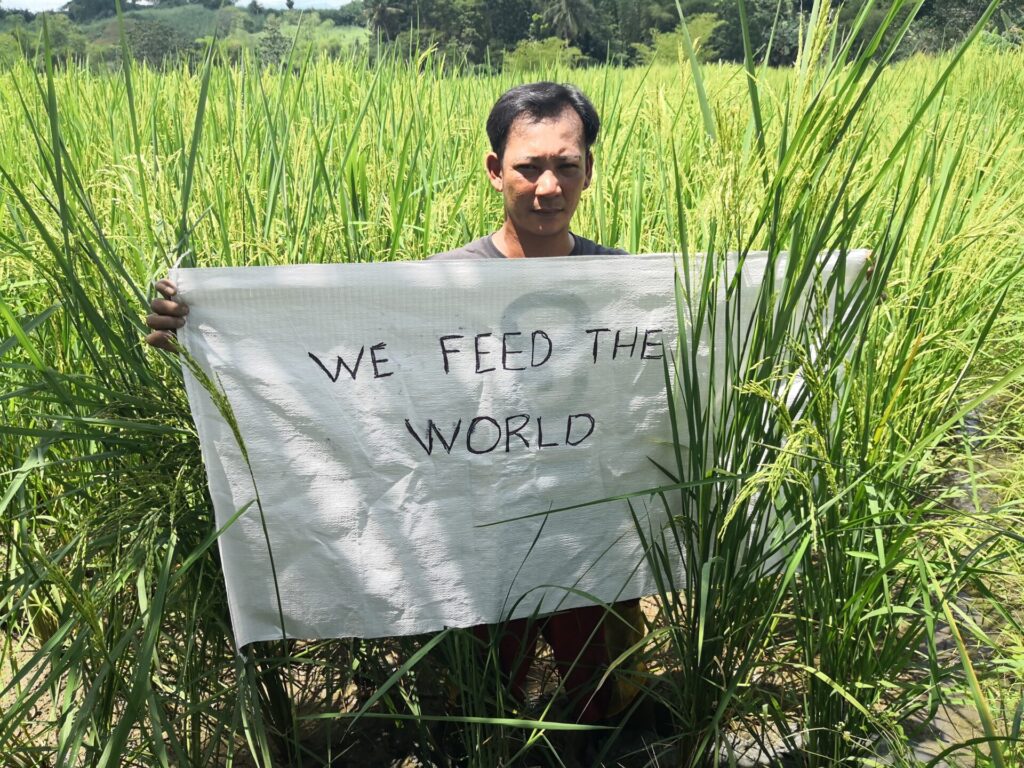
Echoing principles of emergence, Nobel Prize-winning chemist Ilya Prigogine says that “when a complex system is far from equilibrium, small islands of coherence in a sea of chaos have the capacity to shift the entire system to a higher order”. As well as serving as a reminder of the global movement they were a part of, gifting We Feed The World back to the communities that sparked its creation through this series of pop-up exhibitions helped define the “islands of coherence” that were forming and flourishing in its stead. Theirs were stories of sowing seed diversity for resilience in the face of climate disruption; of valuing systems of cooperation over competition; and of turning away from pesticides and chemicals that poison land and waterways. Stories that rarely made it into the mainstream media at the time.
Encouragingly, in the years since We Feed The World, there has been a significant shift towards regenerative alternatives to corporate food production, and with it more coverage in some sectors of the media – and certainly across social media! The potential to accelerate their wide-scale adoption inspired We Feed The UK, and in 2022 we began envisioning a decentralised, regionally-led storytelling project to reach new audiences with hopeful accounts of the change happening on our doorsteps.
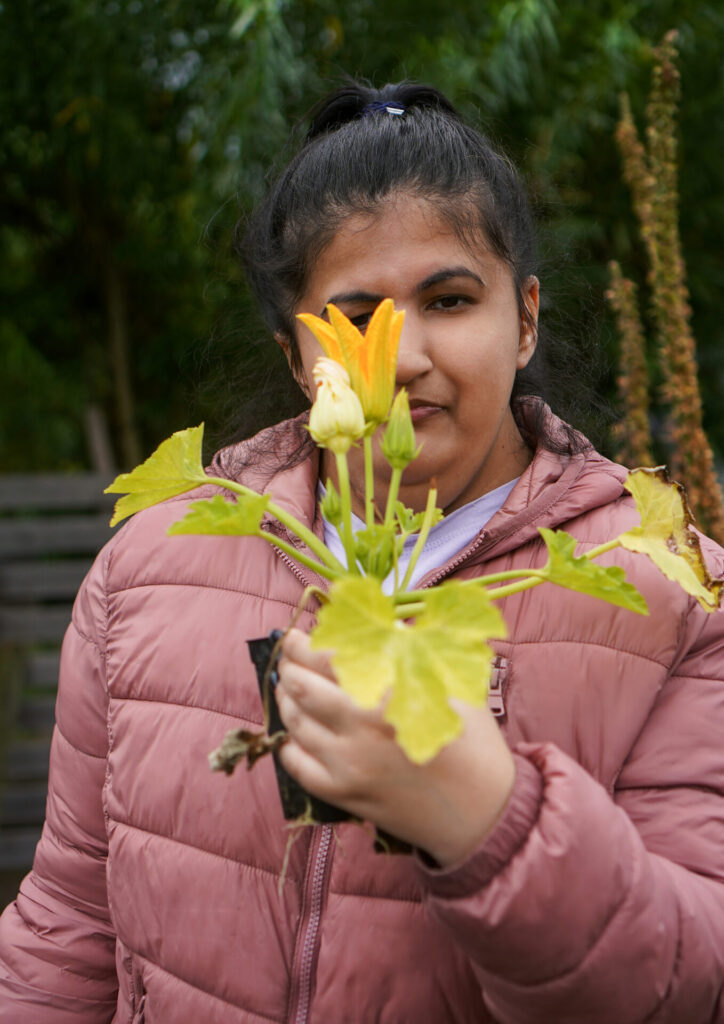

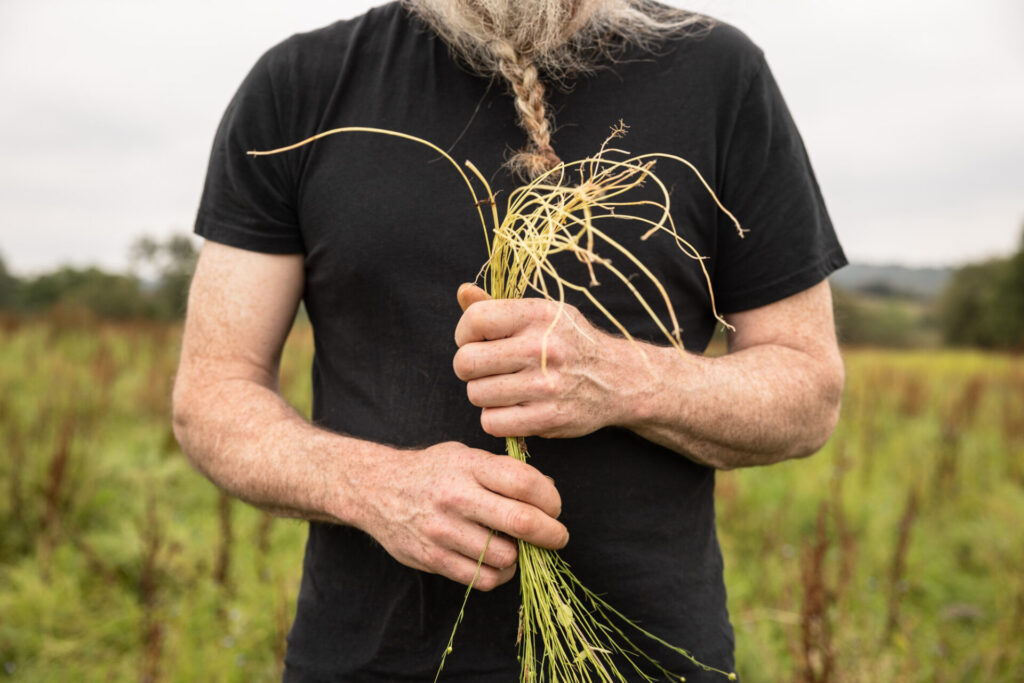
Just as We Feed The World illustrated how agroecological farming and artisanal fishing offer solutions to many of our converging planetary crises, so too does We Feed The UK. The ten stories we focused the project around are vital for the re-imagining that needs to take place across our food system and beyond. They provide a blueprint for others, fostering in the audience a sense of positivity and agency that is contagious. There’s no doubt in our minds that hope is the urgent antidote to the apathy that can affect us all.
We Feed The UK has only deepened our trust in Prigogine’s “islands of coherence”. Our ten We Feed The UK stories, inspiring without shying away from the complexity of the challenges we face, show quiet acts of regionally-embedded resistance and resilience. These stories are beacons of hope.
Finding these islands of coherence and designing We Feed The UK became a puzzle of partnerships, people, and place. In a playful approach to what might otherwise be called research and development, we created a pop-up portrait studio with Louis Little and Tom Groves, a talented team working with the icon of British documentary photography, Martin Parr. Together we set up camp within the heart of the food movement – the Oxford Real Farming Conference, Groundswell, and the Land Skills Fair – and came face to face with inspiring food producers from across the British Isles, each modestly sowing grassroots change without fanfare. Whilst only a handful of these encounters went on to become the ten stories of We Feed The UK, all those we met were – and continue to be – celebrated through a touring pop-up portrait exhibition.
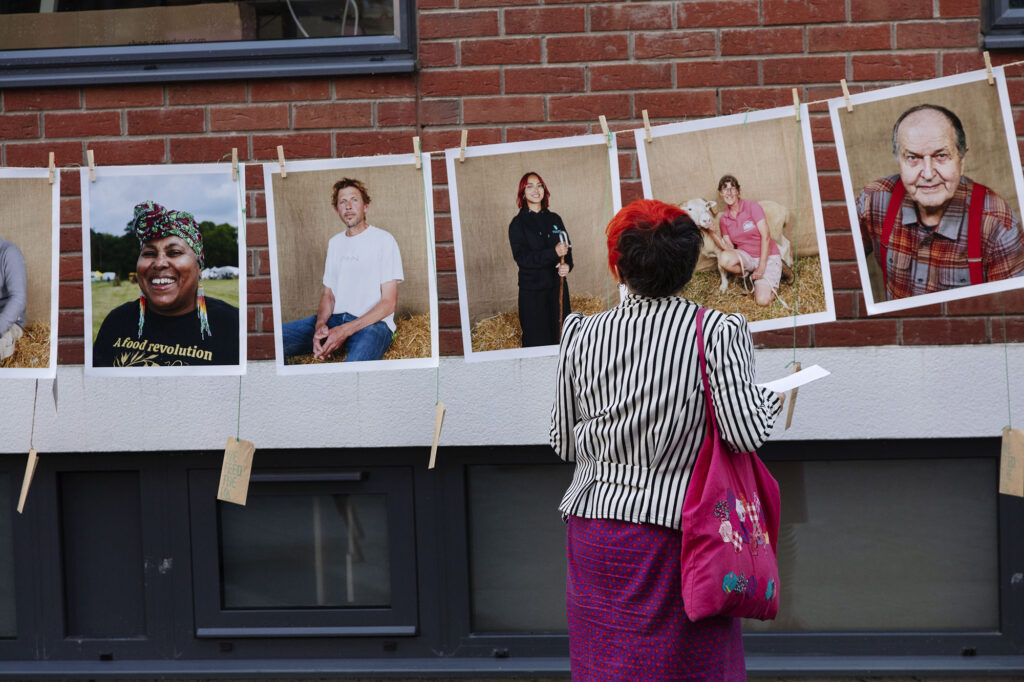
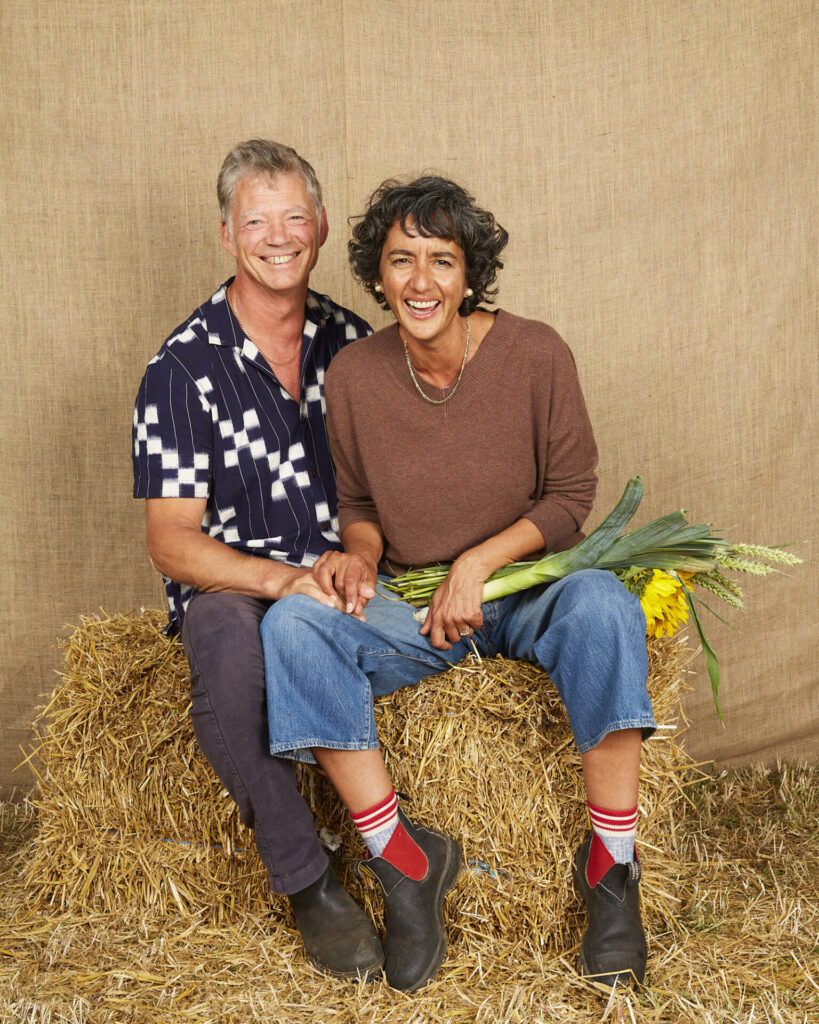
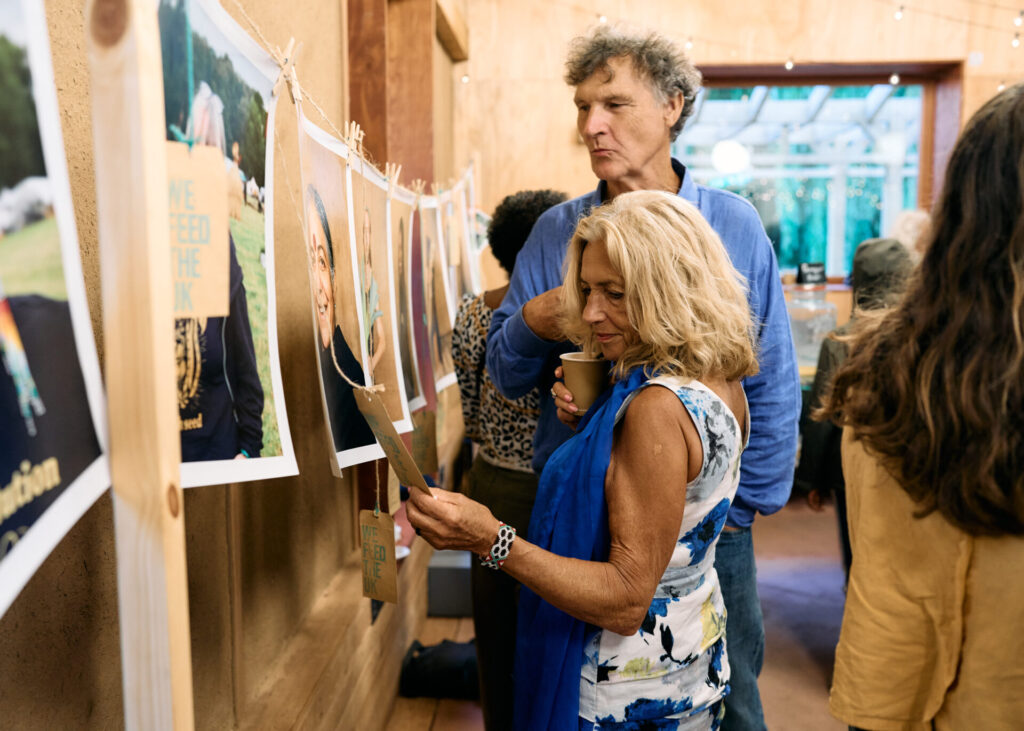
In Margaret Wheatley and Deborah Frieze’s paper, Using Emergence to Take Social Innovation to Scale, they set out four key stages of working with pioneering leaders and communities that have evolved from their research and understanding of how living systems grow and change. The four stages are entitled Name, Connect, Nourish and Illuminate.
Name sets out that “pioneering leaders act in isolation, unaware that their work has broader value. They are too busy to think about extending their work, and too humble to think that others would benefit.” We certainly saw this in We Feed The UK across the farmers and community organisers whose efforts we hoped to showcase. Most were reluctant; too modest to see their work had enormous value for others. We were thrilled that, over time, they came to realise how incredibly important their story really was. Neville Portas from No Diggity in Walsall perfectly summed this up when he said to us:
“We Feed The UK has been a complete delight to be a part of. From my point of view, we were the impostors, as we don’t produce large amounts of staples for our community. However, I have come to realise through the project that we symbolise a growing part of our communities that value nutrient-dense food, as well as community connection and respect for the planet. This project brought us together with others who feel, and act, the same, in whatever field they are in. The spotlight has shone far and wide, and it is a joy to see.”
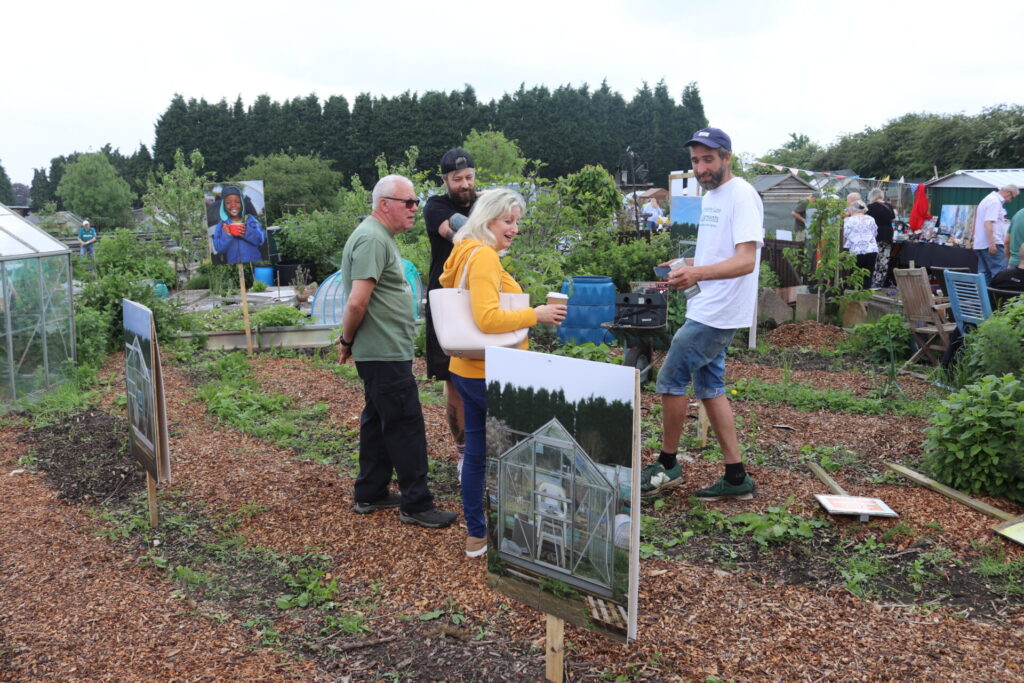
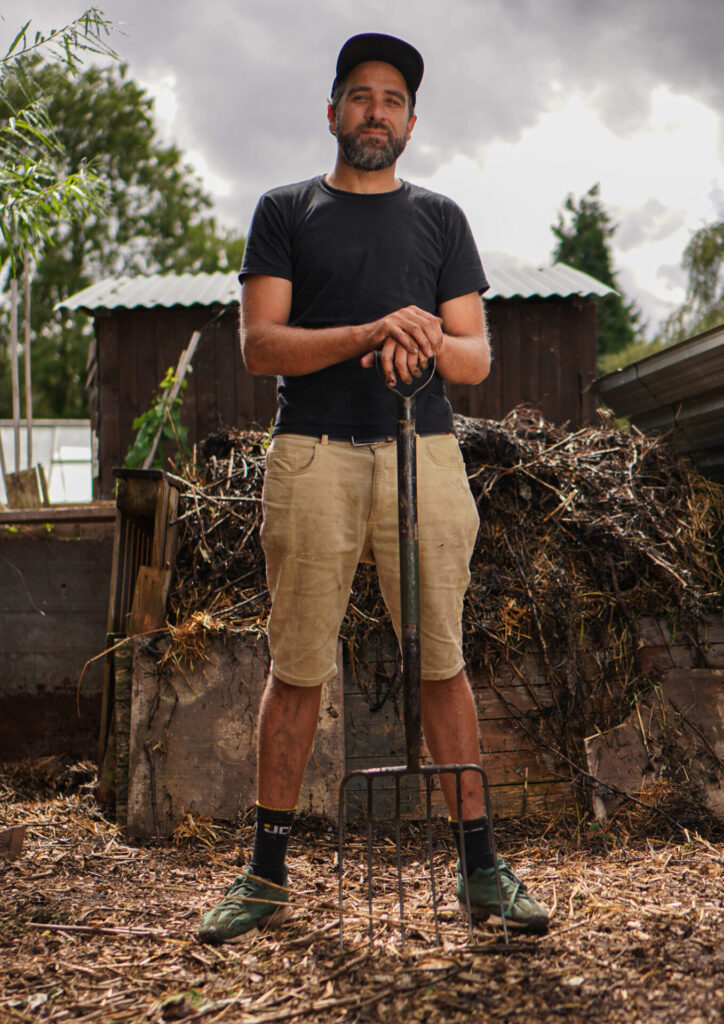
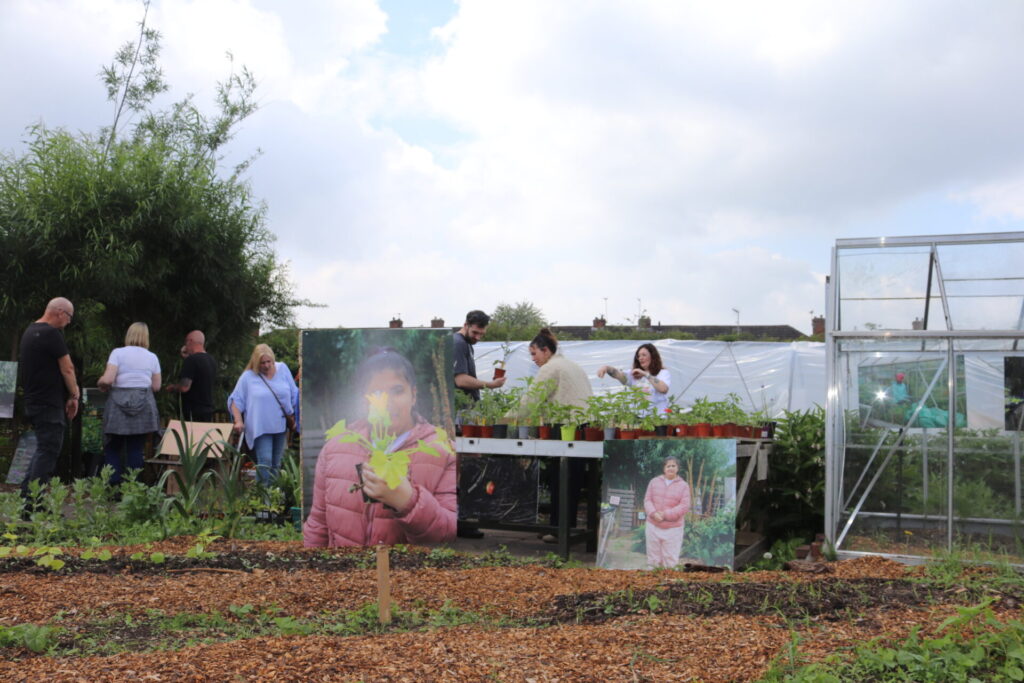
Helen Keys from Mallon Farm in Northern Ireland also told us:
“You have no idea how important We Feed The UK is; not just for sharing the stories of what all the farmers are doing, but just for us to have somebody to go, “what you’re doing is pretty alright!”
The Second stage is Connect, something at the heart of We Feed The UK’s design. The entire forty-plus partner project was an elaborate weaving of layers of connection in multiple directions: across sectors, in unexpected farmer-poet-photographer encounters, and through the array of face-to-face exhibitions, events, and celebrations up and down these isles. Each grouping of artists and of farmers, each gathering of participants and public, served to further ‘web up’ the connections of the project across the arts and agroecology. The results exceeded all our expectations, rippling far beyond the bubbles that usually hinder the reach of the traditional environmental sector. Arts partner Malcolm Dixon at Street Level Photoworks in Glasgow captures this quality of the web of partnerships:
“Working with an award-winning photographer; being involved in a national network of respected galleries; webbing up with poets and collectives; creating new links to community initiatives; and the weaving into this of environmental change-makers: it has been a refreshing experience working with the team at Gaia, and I can only applaud their professionalism and vision. This is a model project which I believe is part of the future of the sector.”
Nourish is the third step set out by Wheatley and Frieze. Here, they say that communities of practice need “learning and knowledge. Knowing what techniques and processes work well and learning from experience as people do the work. Creating opportunities for people to learn together has become our primary way of nourishing their efforts.” The exhibitions, events and gatherings did just this, becoming hubs for the exchange of ideas, challenges and resources both across the network and outwardly with audiences encountering the movement for the first time. Especially potent were the Regenerative Conversations that we convened around each story. These panel discussions welcomed in wider circles of allies, and allowed us to dig deeper into issues that are vital to address for a future of mutual flourishing, yet often not dissected in public forums. The impact of this opportunity to “nourish” has been felt not only by those in the audience, but also by the panel members themselves.
“I never knew that my personal stories of agony and joy would fascinate so many people I met for the first time. When I saw tears in a few eyes of some of these exceptional people in the audience, I felt blessed and humbled.”
Dr Debal Deb, saving rice from imminent extinction in India and part of our Regenerative Conversation about a grain revolution
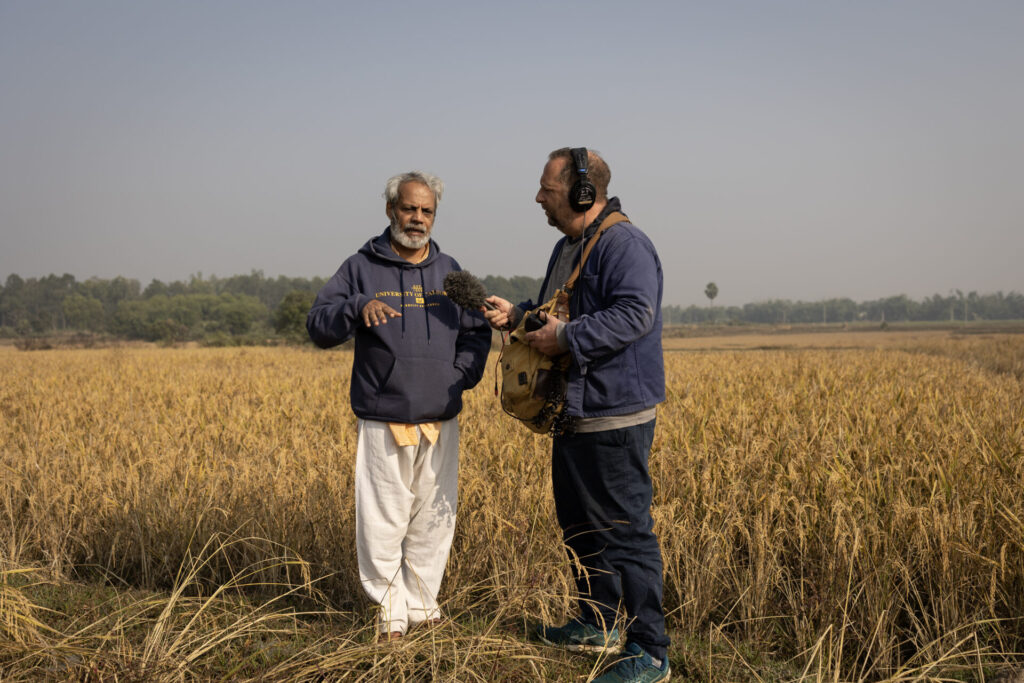
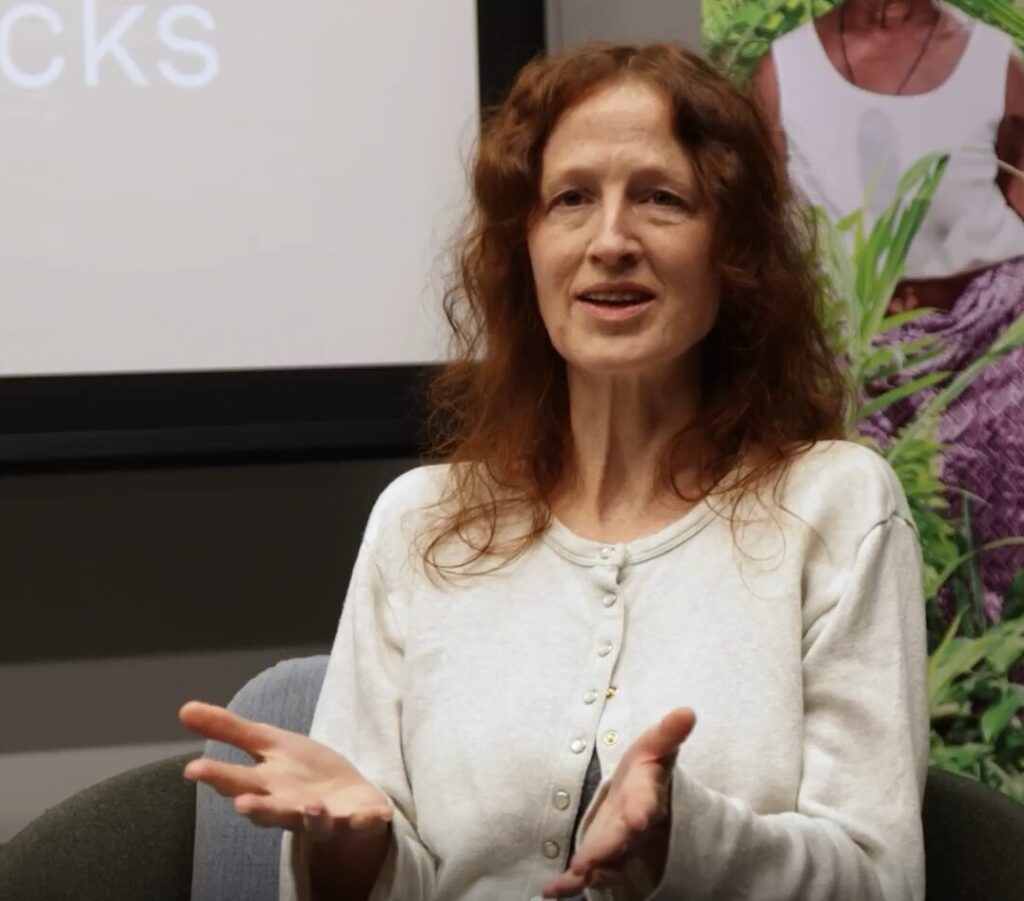
“We need to know how our fish is caught. We care. We want to know. And the industry has gone out of its way to make sure that’s not possible.”
Caroline Bennett, founder of Sole of Discretion and part of a Regenerative Conversation about one of the least-addressed issues in global food production – fishing.
Every Regenerative Conservation was filmed and has since been shared with global audiences online, allowing ever more people to do exactly as Wheatley and Frieze suggest: “learn from experience as people do the work”.
“If we have real life case studies then we’ve got a chance of change”
Audience member at a Regeneraive Conversaion about farming with nature in the north of England.
The final stage is illuminate, which Wheatley and Frieze describe as “examples of what the new world could be”. This really strikes to the heart of We Feed The UK: ten stories of agroecology in action – each a blueprint for change and a glimpse into the small farm future we can all get behind. Whilst our ten stories were never purported to be taking place in anything other than the present day, we could just as easily have taken a leaf out of Rob Hopkins’ book, How to Fall in Love With The Future, and “illuminated” these stories as the findings of a time traveller in 2030. Rob travels to a future where “we did it!” – we rose to the challenges ahead of us and came together as community in the process. He uses this as the mechanism to foster agency over apathy, just as we have used ten emblematic stories of change happening right now. Whichever approach one takes to amplifying these “islands of coherence”, there is no doubt that championing them and making them available in the collective public conscience is critical if we are ever going to rise to the urgency of the polycrises we face. We must first see it, if we are to believe it. We need the new story, as our Hot Poet collaborator Diz Undone (formerly Dizraeli) so powerfully sums up: “We are making the culture and culture makes mindsets. We can inspire this change that needs to happen.”
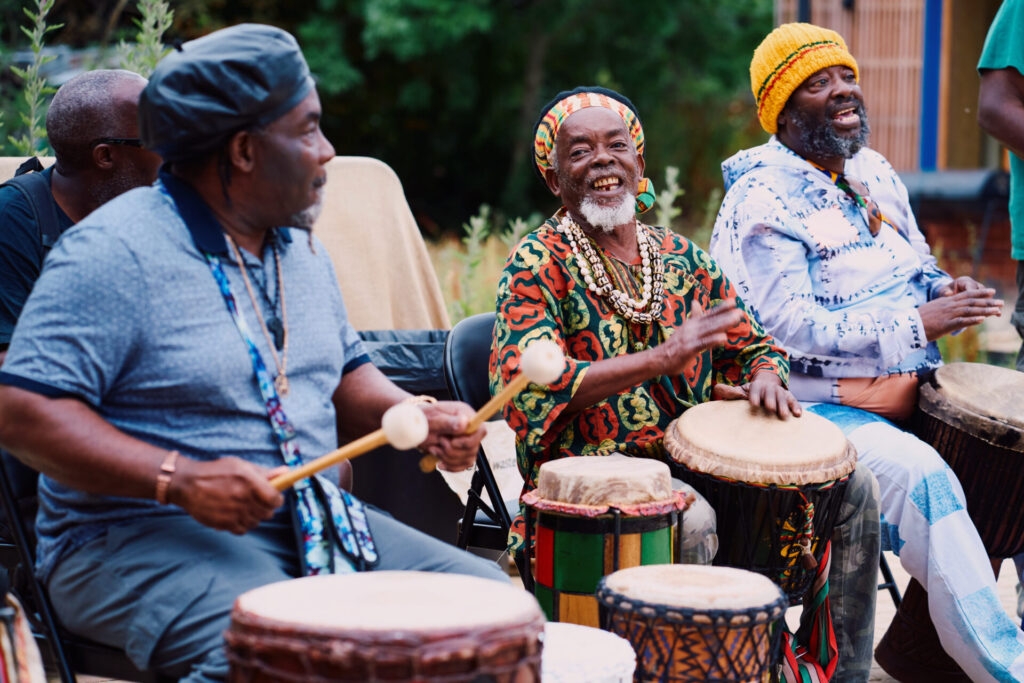
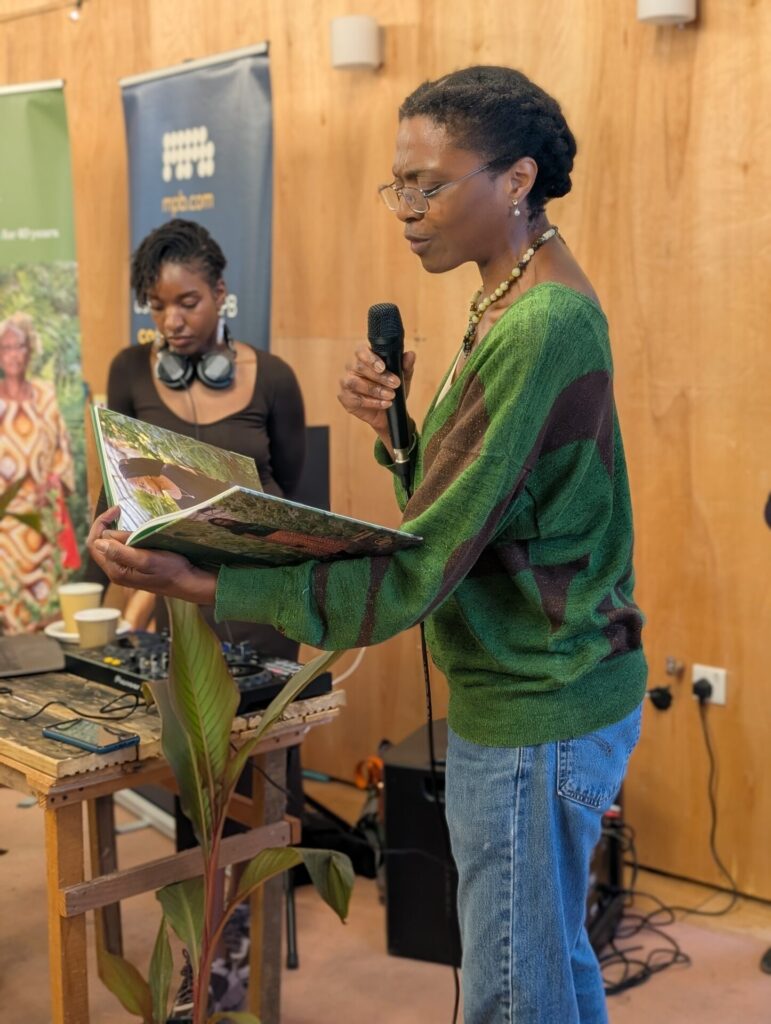
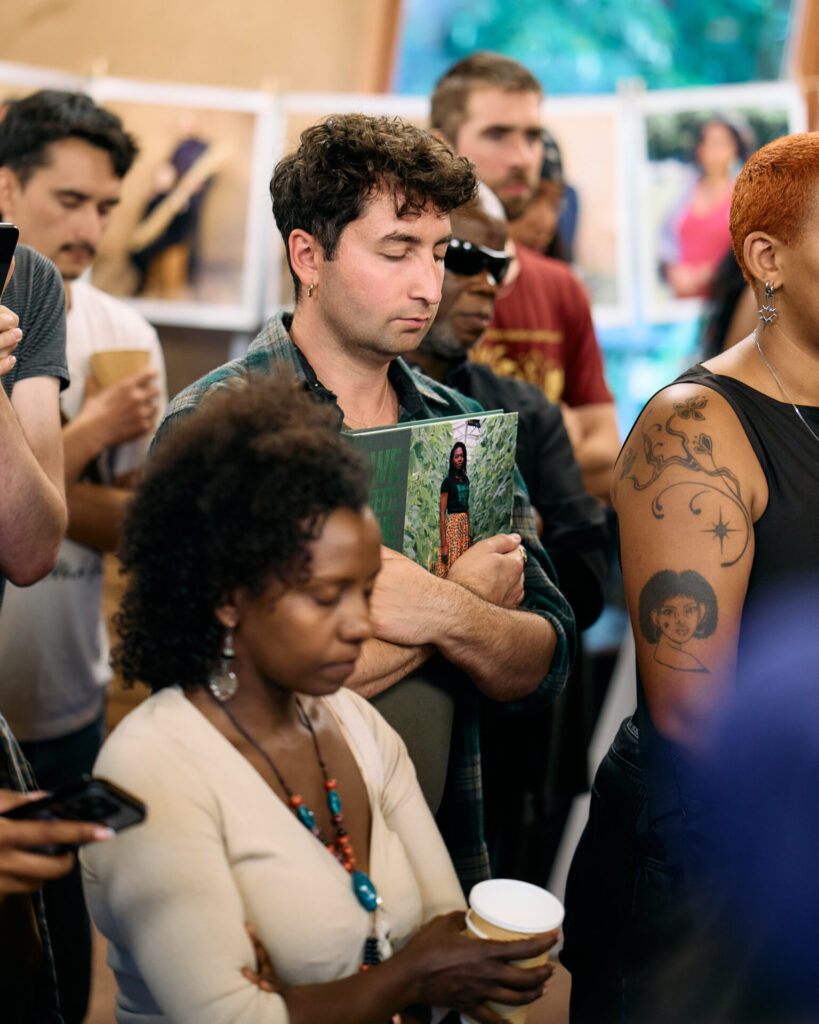
Working with artists – particularly in this instance with photographers and poets – is at the heart of We Feed The UK, and we are enormously grateful to the ten photographers – Johannes Pretorius, Sophie Gerrard, Ayesha Jones, Andy Pilsbury, Aaron Schuman, Arpita Shah, Johannah Churchill, Yvette Monahan, Jon Tonks and Lúa Ribeira – and ten Hot Poets – Abby Olivera, Testament, Iona Lee, Bohdan Piaseki, Ifor Ap Glyn, Jasmine Gardosi, Zena Edwards, Kate Fox, Chris Redmond and Dizraeli – who accompanied their farming and fishing protagonists so passionately on the project. Artists are our allies at this time. They are not only the culture creators but the best communicators, “cutting through the doom and despair” to “change the narrative”, as co-founder of Hot Poets, Liv Torc exclaims. Rob Hopkins’ latest book and campaign makes a compelling call to the optimists, the artists, the storytellers and the poets as being critical to rise to the challenges of these times, and as we “illuminate” these stories of change through a collaboration between agroecology and art, we really couldn’t agree more.
In the We Feed The World book, indomitable activist and author Vandana Shiva said:
“As we look to the future, there are two divergent paths before humanity – one rapidly moving down an industrial path, promoting ‘farming without farmers’, and ‘food without farms’. This path will uproot more farmers, destroy more forests and biodiversity and spread more food-related chronic diseases. The other is the agroecological path of food sovereignty. This path is being protected, nurtured and promoted by the millions of small farmers and fishing communities across the world who have kept their eco-friendly practices alive in spite of policies, subsidies, research and markets promoting inefficient, planet-destroying, health-destroying industrial agriculture.”
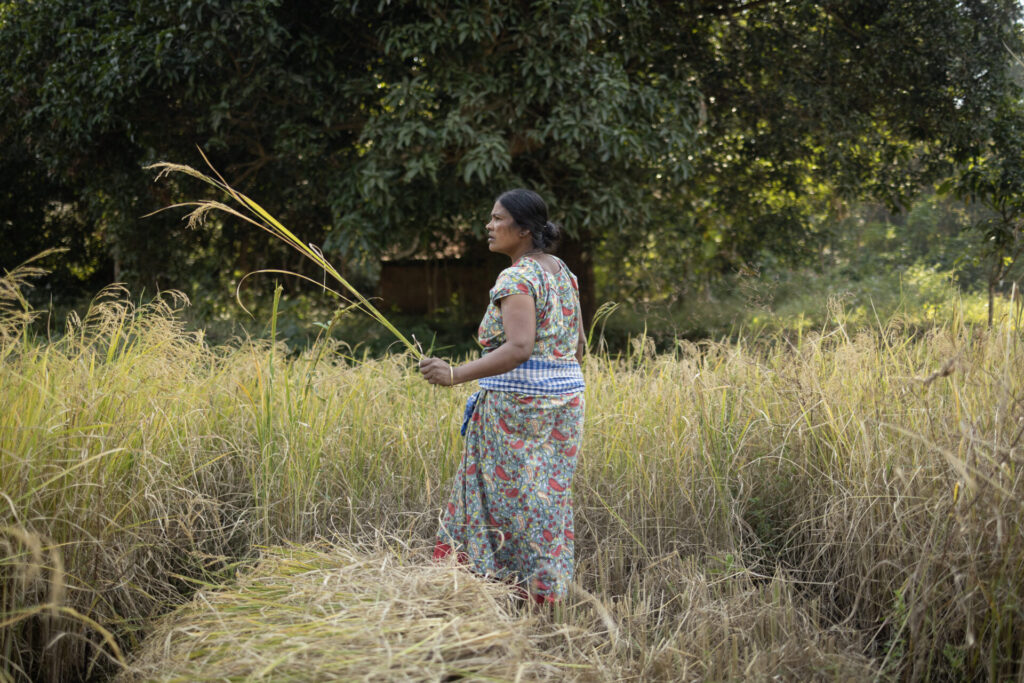


Just as with We Feed The World, We Feed The UK introduces audiences to those already walking this regenerative, agroecological path. They are the trailblazers, and they’re busy trailblazing right now. Their journeys explore growing food as a shared act of growing community; intergenerational land tending and interspecies relationship mending; and of justice for future generations of all species.
Four key ingredients for emergence in action, inspired by We Feed The UK:
- Work with artists to name a new story
- Create the conditions for the story to spread through unexpected connections across sectors, lives and lands
- Nourish this narrative’s shared hurdles and solutions – remembered and learnt, ancient and innovative
- Illuminate the islands of coherence that emerge, with the power to inspire individual agency and collective change
